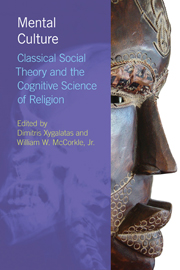Book contents
- Frontmatter
- Contents
- List of illustrations
- Contributors
- 1 Introduction: social minds, mental cultures – weaving together cognition and culture in the study of religion
- 2 Explanatory pluralism and the cognitive science of religion: why scholars in religious studies should stop worrying about reductionism
- 3 Early cognitive theorists of religion: Robin Horton and his predecessors
- 4 The opium or the aphrodisiac of the people? Darwinizing Marx on religion
- 5 Immortality, creation and regulation: updating Durkheim's theory of the sacred
- 6 Non-ordinary powers: charisma, special affordances and the study of religion
- 7 Malinowski's magic and Skinner's superstition: reconciling explanations of magical practices
- 8 Towards an evolutionary cognitive science of mental cultures: lessons from Freud
- 9 Piaget on moral judgement: towards a reconciliation with nativist and sociocultural approaches
- 10 Building on William James: the role of learning in religious experience
- 11 Explaining religious concepts: Lévi-Strauss the brilliant and problematic ancestor
- 12 The meaningful brain: Clifford Geertz and the cognitive science of culture
- 13 Cognitive science and religious thought: the case of psychological interiority in the Analects
- 14 Conclusion: moving towards a new science of religion; or have we already arrived?
- Bibliography
- Index
9 - Piaget on moral judgement: towards a reconciliation with nativist and sociocultural approaches
- Frontmatter
- Contents
- List of illustrations
- Contributors
- 1 Introduction: social minds, mental cultures – weaving together cognition and culture in the study of religion
- 2 Explanatory pluralism and the cognitive science of religion: why scholars in religious studies should stop worrying about reductionism
- 3 Early cognitive theorists of religion: Robin Horton and his predecessors
- 4 The opium or the aphrodisiac of the people? Darwinizing Marx on religion
- 5 Immortality, creation and regulation: updating Durkheim's theory of the sacred
- 6 Non-ordinary powers: charisma, special affordances and the study of religion
- 7 Malinowski's magic and Skinner's superstition: reconciling explanations of magical practices
- 8 Towards an evolutionary cognitive science of mental cultures: lessons from Freud
- 9 Piaget on moral judgement: towards a reconciliation with nativist and sociocultural approaches
- 10 Building on William James: the role of learning in religious experience
- 11 Explaining religious concepts: Lévi-Strauss the brilliant and problematic ancestor
- 12 The meaningful brain: Clifford Geertz and the cognitive science of culture
- 13 Cognitive science and religious thought: the case of psychological interiority in the Analects
- 14 Conclusion: moving towards a new science of religion; or have we already arrived?
- Bibliography
- Index
Summary
In undertaking a comprehensive scientific study of religion, as in the comprehensive study of any area of life, it is essential to include a developmental perspective. We cannot really comprehend an individual's present beliefs without knowing the past that has brought them into being. The study of religious cognition therefore demands a consideration of cognitive development. And no figure has had more influence on the study of cognitive development than Jean Piaget (1896—1980), the founder of constructivism, author or editor of over eighty books and over 500 articles and reports, and by his own admission, “the most criticized author in the history of psychology” (quoted by Smith 1996: vi). Despite his enormous contributions to child psychology, Piaget was not primarily interested in children for their own sake, but rather in what the study of children's minds could reveal about how adult cognition comes into being. He commented that “after having tried to describe the child's mentality as distinct from the adult's we have found ourselves obliged to include it in our descriptions of the adult mind in so far as the adult still remains a child” (Piaget 1932: 77). In Piaget's view, similar cognitive processes are found in both adults and children; yet qualitative differences in cognition arise because certain processes predominate in adults and others in children.
- Type
- Chapter
- Information
- Mental CultureClassical Social Theory and the Cognitive Science of Religion, pp. 128 - 144Publisher: Acumen PublishingPrint publication year: 2013



